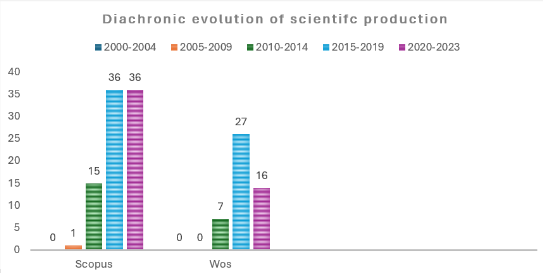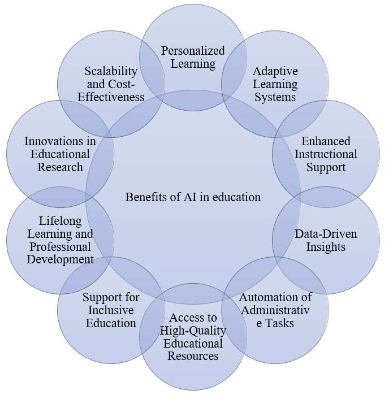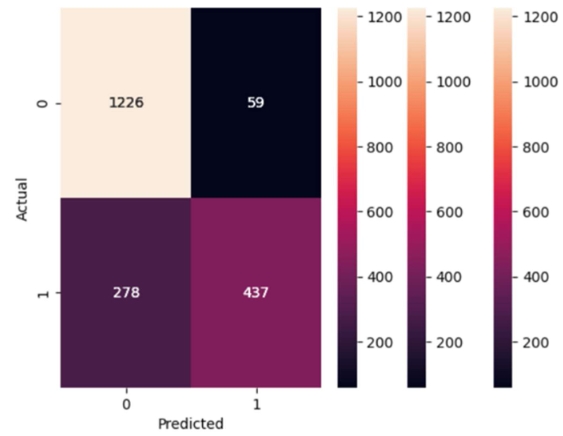Artificial Intelligence in education: A comprehensive study
Abstract
This comprehensive study delves into the multifaceted role of AI in education, exploring its applications, benefits, challenges, and future implications. The purpose of the study is to show how AI in education helps educators identify gaps in student knowledge and provide targeted feedback to improve learning outcomes. As a methodology, the library method and the study and review of various documents have been used in this research. The study examines the diverse range of AI technologies employed in educational settings, including intelligent tutoring systems, personalized learning platforms, educational chatbots, and virtual reality simulations. Furthermore, the study delves into the numerous benefits that AI brings to education. It highlights how AI-powered analytics and data-driven insights enable educators to gain deeper insights into student learning patterns, identify areas for improvement, and tailor instructional strategies accordingly. Additionally, AI-driven tools promote inclusivity by providing personalized support to learners with diverse needs and learning styles. Despite its transformative potential, the study also acknowledges the challenges and ethical considerations associated with integrating AI into education. Data privacy, algorithmic bias, and the digital divide are examined in detail, emphasizing the importance of responsible AI deployment and ethical guidelines. Looking ahead, the study explores the future implications of AI in education and the evolving role of educators in AI-enabled classrooms. It discusses how AI technologies will continue to evolve, offering new opportunities for collaborative learning, skill development, and lifelong education. In conclusion, this comprehensive study underscores the profound impact of AI on education and the need for thoughtful implementation strategies that prioritize equity, inclusivity, and ethical considerations. By harnessing the potential of AI, education systems can better prepare learners for the challenges and opportunities of the future.
References
[1]Zhang C, Lu Y. Study on artificial intelligence: The state of the art and future prospects. Journal of Industrial Information Integration. 2021; 23: 100224. doi: 10.1016/j.jii.2021.100224
[2]Wang Y, Fu EY, Zhai X, et al. Introduction of artificial Intelligence. In: Intelligent Building Fire Safety and Smart Firefighting. Springer Nature Switzerland; 2024.
[3]Abulibdeh A, Zaidan E, Abulibdeh R. Navigating the confluence of artificial intelligence and education for sustainable development in the era of industry 4.0: Challenges, opportunities, and ethical dimensions. Journal of Cleaner Production. 2024; 140527.
[4]Almufarreh A, Arshad M. Promising Emerging Technologies for Teaching and Learning: Recent Developments and Future Challenges. Sustainability. 2023; 15(8): 6917. doi: 10.3390/su15086917
[5]Ahmad K, Iqbal W, El-Hassan A, et al. Data-Driven Artificial Intelligence in Education: A Comprehensive Review. IEEE Transactions on Learning Technologies. 2024; 17: 12-31. doi: 10.1109/tlt.2023.3314610
[6]Elbanna S, Armstrong L. Exploring the integration of ChatGPT in education: adapting for the future. Management & Sustainability: An Arab Review. 2024; 3(1): 16-29.
[7]Murtaza M, Ahmed Y, Shamsi JA, et al. AI-Based Personalized E-Learning Systems: Issues, Challenges, and Solutions. IEEE Access. 2022; 10: 81323-81342. doi: 10.1109/access.2022.3193938
[8]Jaboob M, Hazaimeh M, Al-Ansi AM. Integration of Generative AI Techniques and Applications in Student Behavior and Cognitive Achievement in Arab Higher Education. International Journal of Human–Computer Interaction. 2024; 1-14. doi: 10.1080/10447318.2023.2300016
[9]Hooda M, Rana C, Dahiya O, et al. Artificial intelligence for assessment and feedback to enhance student success in higher education. Mathematical Problems in Engineering. 2022; 1-19.
[10]Ramarajan M, Dinesh A, Muthuraman C, et al. Al-Driven Job Displacement. In: Cases on AI Ethics in Business. IGI Global; 2024.
[11]Chen X, Zou D, Xie H, et al. Two decades of artificial intelligence in education. Educational Technology & Society. 2022; 25(1): 28-47.
[12]Singh V, Ram S. Impact of Artificial Intelligence on Teacher Education. Shodh Sari-An International Multidisciplinary Journal. 2024; 03(01): 243-266. doi: 10.59231/sari7669
[13]Guo L, Wang D, Gu F, et al. Evolution and trends in intelligent tutoring systems research: a multidisciplinary and scientometric view. Asia Pacific Education Review. 2021; 22(3): 441-461. doi: 10.1007/s12564-021-09697-7
[14]Saibene A, Assale M, Giltri M. Expert systems: Definitions, advantages and issues in medical field applications. Expert Systems with Applications. 2021; 177: 114900.
[15]Clark D. Artificial Intelligence for Learning: Using AI and Generative AI to Support Learner Development. Kogan Page Publishers; 2024.
[16]Ikegwu AC, Nweke HF, Anikwe CV. Recent trends in computational intelligence for educational big data analysis. Iran Journal of Computer Science. 2024; 7(1): 103-129.
[17]Available online: https://talkai.info/chat/ (accessed on 1 May 2024).
[18]Owoc ML, Sawicka A, Weichbroth P. Artificial intelligence technologies in education: benefits, challenges and strategies of implementation. In: IFIP International Workshop on Artificial Intelligence for Knowledge Management. Springer International Publishing; 2019.
[19]Zaman BU. Transforming Education Through AI, Benefits, Risks, and Ethical Considerations. Available online: https://www.techrxiv.org/doi/full/10.36227/techrxiv.24231583.v1 (accessed on 25 May 2024).
[20]Qin H, Wang G. Benefits, challenges and solutions of Artificial Intelligence applied in education. In: Proceedings of the 2022 11th International Conference on Educational and Information Technology (ICEIT 2022); 6-8 January 2022; Chengdu, China.
[21]Tahiru F. AI in Education. Journal of Cases on Information Technology. 2021; 23(1): 1-20. doi: 10.4018/jcit.2021010101
[22]Zhang K, Aslan AB. AI technologies for education: Recent research & future directions. Computers and Education: Artificial Intelligence. 2021; 2: 100025. doi: 10.1016/j.caeai.2021.100025
[23]Holmes W, Tuomi I. State of the art and practice in AI in education. European Journal of Education. 2022; 57(4): 542-570. doi: 10.1111/ejed.12533
[24]Luan H, Geczy P, Lai H, et al. Challenges and future directions of big data and artificial intelligence in education. Frontiers in Psychology. 2020; 11: 580820.
[25]Grassini S. Shaping the future of education: exploring the potential and consequences of AI and ChatGPT in educational settings. Education Sciences. 2023; 13(7): 692.
[26]Schiff D. Out of the laboratory and into the classroom: The future of artificial intelligence in education. AI & SOCIETY. 2020; 36(1): 331-348. doi: 10.1007/s00146-020-01033-8
[27]Murphy RF. Artificial Intelligence Applications to Support K-12 Teachers and Teaching. Rand Corporation; 2019.
[28]Grams D. A Quantitative Study of the Use of Dreambox Learning and Its Effectiveness in Improving Math Achievement of Elementary Students with Math Difficulties [PhD thesis]. Northcentral University; 2018.
[29]Pesovski I, Santos R, Henriques R, Trajkovik V. Generative AI for Customizable Learning Experiences. Sustainability. 2024; 16(7): 3034.
[30]Aggarwal D. Integration of innovative technological developments and AI with education for an adaptive learning pedagogy. China Petroleum Processing and Petrochemical Technology. 2023; 23(2).
[31]Bahari A, Smith M, Scott H. Examining the Impact of Chatbot-Based Language Learning Support, Adaptive Learning Algorithms, and Virtual Reality Language Immersion on EFL Learners’ Language Learning Proficiency and Self-Regulated Learning Skills. Available online: https://www.preprints.org/manuscript/202403.1715/v1 (accessed on 25 May 2024).
[32]Alasadi EA, Baiz CR. Generative AI in Education and Research: Opportunities, Concerns, and Solutions. Journal of Chemical Education. 2023; 100(8): 2965-2971. doi: 10.1021/acs.jchemed.3c00323
[33]Benzaghta MA, Elwalda A, Mousa M, et al. SWOT analysis applications: An integrative literature review. Journal of Global Business Insights. 2021; 6(1): 55-73. doi: 10.5038/2640-6489.6.1.1148
Copyright (c) 2024 Milad Shahvaroughi Farahani, Ghazal Ghasmi

This work is licensed under a Creative Commons Attribution 4.0 International License.









